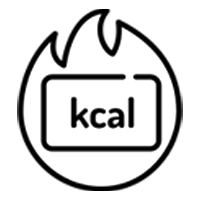Show summary Hide summary
How many calories do we burn walking?

Everything you need to know about walking
Wondering how many calories you burn by walking for 30 minutes or 1 hour? Just enter your profile to calculate your energy expenditure. Our tool shows how many calories are burned while walking depending on session time.
Find other REGIVIA calculators:
You can also see the number of calories burned for :
Walking: A few examples of energy expenditure depending on weight and activity time.
Use the table below to see how many calories you lose by walking!
Walking
Normal intensity 5km/h
Expenditure in Kilocalories
| Weight | 15 minutes | 30 minutes | 1 hour |
|---|---|---|---|
| 40 kg | 32 | 63 | 126 |
| 50 kg | 39 | 79 | 158 |
| 60 kg | 47 | 95 | 189 |
| 70 kg | 55 | 110 | 221 |
| 80 kg | 63 | 126 | 252 |
| 90 kg | 71 | 142 | 284 |
See detailed calculations and metabolic equivalent for walking
Everything you need to know about walking
FIND OUT MORE ABOUT WALKING
Walking is an activity that can be enjoyed by everyone, whatever their physical condition. From the youngest to the oldest, walking is suitable for everyone!
There are several different types of walking, which vary considerably in terms of energy expenditure, from calm and moderate to intense and fast.
The main types of walking include classic walking (everyday walking or strolls), fast or sporty walking and Nordic walking (with poles).
Whether it’s a brisk walk, a stroll in the countryside or a simple stroll around town, walking offers many physical and mental health benefits.
Some benefits of walking:
- Improved cardiovascular fitness: Walking is an endurance activity that works the heart and lungs. It helps improve cardiorespiratory capacity, strengthens the cardiovascular system and reduces the risk of cardiovascular disease.
- Muscle strengthening: Walking involves many of the body’s muscles, in particular those of the legs, buttocks and abdominal muscles. It tones muscles and improves muscular strength and endurance.
- Weight control : Walking is an activity that helps burn calories, which can contribute to weight loss or maintaining a healthy weight. By combining regular walking with a balanced diet, you can promote a healthy body composition.
- Improved bone health: Walking is a moderate-impact exercise that stimulates bone density and strengthens bones. It can help prevent osteoporosis and maintain strong, healthy bones.
- Stimulation of blood circulation: Walking activates blood circulation throughout the body, promoting the supply of oxygen and nutrients to tissues. This can improve cardiovascular health, reduce the risk of blood clots and promote better vascular health.
- Improved mood and reduced stress: Walking outdoors or in a natural environment can have a positive effect on mood, reduce stress and promote a sense of well-being. Physical activity releases endorphins, the happy hormones that make you feel calm and content.
- Cognitive stimulation: Regular walking is associated with improved cognitive function, particularly memory, attention and creativity. It also promotes mental relaxation and can help reduce symptoms of anxiety and depression.
In conclusion, walking is a simple activity that is beneficial to physical and mental health. It can be done at any age, requires no special equipment and can be easily integrated into daily life. Whether it’s to improve your physical condition, relax or enjoy nature, walking is a healthy habit you can adopt to take care of yourself.
How to calculate the number of calories burned walking
The result displayed is expressed in Kcal and is calculated using the MET (Metabolic Equivalent of Task). The MET for each activity is the result of statistical data and cannot therefore be interpreted as an exact calculation, but rather as an estimate that takes into account the MET value and the ratio between the time spent doing an activity and the weight of the individual.
For example: the MET value for ordinary walking is 3. This means that a person who is walking consumes 3 times more energy than when resting. This varies, of course, with the level of intensity, as we shall see below.
MET values for different levels of walking intensity
- Calm walking MET = 3
- Brisk walking MET = 4.5
- Nordic Walking MET = 5
- Olympic walking MET = 6.5
Discover the detailed formula to calculate your daily energy expenditure while walking
Consumption in Kcal per minute = (METs*3.5*Weight in kilos)/200
This means that for a person weighing 60 kilos taking a leisurely walk for 30 minutes:
Consumption in Kcal per minute = (3*3.5*60)/200 = 3.15 Kcal/min
So for 30 minutes = 3.15*30 = 94 kcal for 30 minutes
All sports in detail!
Increase Your Caloric Expenditure with Walking
Walking is a simple yet effective way to boost your daily caloric expenditure. By incorporating more steps into your routine, you can enhance your overall fitness and health. Explore the links below to understand how walking can help you achieve your fitness goals:
- How many steps a day should you take to stay healthy?
- How long does it take to walk 10,000 steps?
- How many km is 10,000 steps?
- How many steps should you take a day to lose weight and shed pounds?
- How many steps are there in a kilometer?
- How many steps should we take a day to become more active and avoid being sedentary?



















































